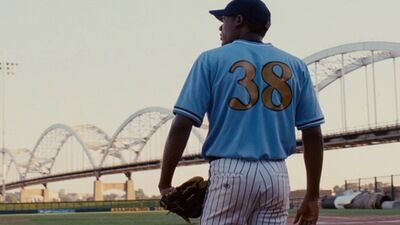Are there certain baseball movies you hear quoted a lot on the ballfield or around the folks you work with?
“Major League” definitely comes up. Bits of “Moneyball” do get quoted—even though, obviously, a lot of scouts, not incorrectly, have strong feelings about that movie. It’s funny, “Field of Dreams” almost never does. But no extended mound visit can go by without somebody saying “candlesticks” thanks to “Bull Durham.”
In the world of arthouse films, there’s a term called “slow cinema,” which is given to longer movies that usually move at a more deliberate pace—maybe not a lot happens, plotwise, in them. Among my friends who love international cinema and baseball, we talk about the similarities between slow cinema and baseball: how they both require patience as a viewer, but the rewards come from the intense concentration you apply to both.
I know you’re not a professional film critic, but you’ve seen some slow cinema: Do you think the comparison makes sense?
I have always thought baseball and literature go well together because they’re meditative. For me at least, baseball isn’t a sport that can be rushed, and I don’t say that as a criticism.
One thing I always loved about ice hockey, indoor soccer and indoor lacrosse is that those are fast and exciting, and you can never really turn away—that’s great, too. But baseball, there’s often a slow build, and it gives you time to think about what’s happening in front of you. It also gives you time to not think about what’s happening in front of you—just enjoy your beer and talk to your friends, and that’s fine. No criticism—you enjoy baseball the way you want to enjoy baseball.
Two things I particularly enjoy doing is reading and watching baseball. But slow cinema does have a bit more of that literary quality: “We’re taking our time, we get there when we get there.” I don’t know slow cinema super-well, and sometimes I’m not along for the ride—sometimes I’m like, “Can you hit the gas already? Because we’re not getting anywhere”—but I feel that way at baseball games sometimes, too.
I’m often struck by the fact that you and I both have jobs where people want to come up to us and talk about them. Lots of folks watch movies and baseball, so we cover subjects that everyone can have an opinion about—and have no problem sharing those opinions with us.
Baseball is just part of the fabric of [my] family. Baseball is very tied into daily life for me and for all of us. I often go out with friends and friends around here who know what I do. They generally want to talk about the Phillies, and they’ll often apologize: “I’m sure you don’t want to talk about work.” And I’m like, “You know what? I’m used to it.” I have a job that people like to talk about. I’m pretty lucky.

